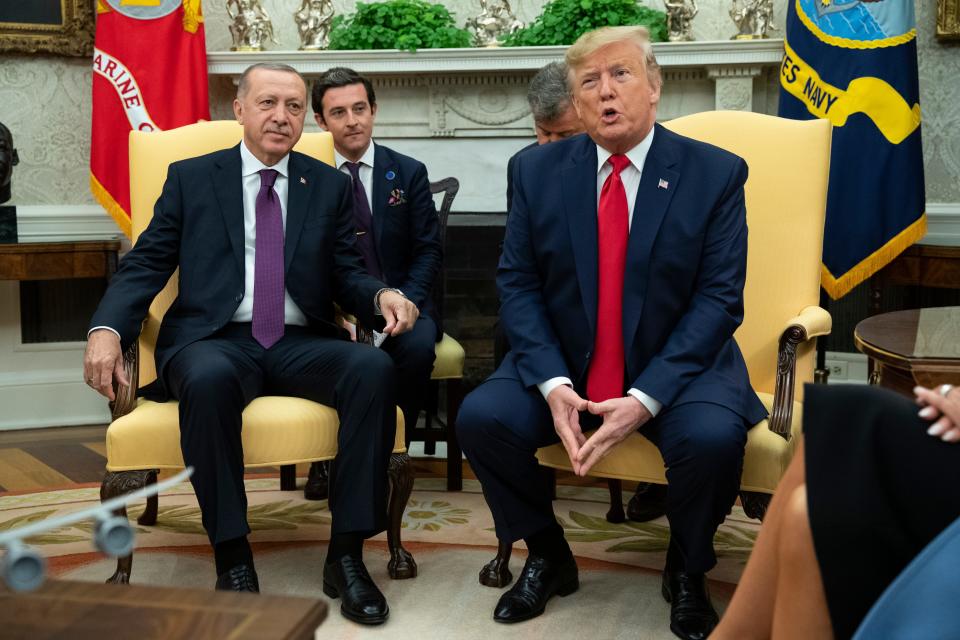'A big fan': Trump welcomes Turkey's Erdogan despite bipartisan concern over Syria attack
WASHINGTON – President Donald Trump heaped praise on Turkish President Recep Tayyip Erdogan during a day-long visit to the White House on Wednesday despite bipartisan concern that the authoritarian leader is sowing chaos in the Middle East.
As House lawmakers began public hearings to investigate Trump's interactions with Ukraine, the president fully embraced another controversy weighing on his White House: His decision last month to withdraw U.S. troops from northern Syria, clearing the way for Turkey's invasion into that country days later.
There was little sign Wednesday of the bipartisan criticism that has cropped up in response to Trump's approach to Turkey. After a series of meetings, the president told reporters during an East Room press conference that he hopes to broker an agreement with Turkey that would significantly expand trade between the two countries.
"I'm a big fan of the president," Trump said of Erdogan.
The meeting with Erdogan, in the works for weeks, allowed Trump to marshal some attention away from the impeachment hearings taking place on Capitol Hill, but it also renewed focus on an issue that has caused rebellion within his own party.
"Although I have expressed concerns about granting President Erdogan such an honor in light of his recent actions, I hope the meeting produces better behavior from this important NATO ally," Senate Republican leader Mitch McConnell said earlier Wednesday. "I share my colleagues' uneasiness at seeing President Erdogan honored at the White House."
Both Democrats and Republicans have argued Trump's decision to withdraw U.S. troops from Syria was a betrayal of the Kurdish forces that helped American troops fight the Islamic State, also known as ISIS. Trump dismissed those concerns Wednesday.
Trump said Erdogan, who has described many of the Kurds on the Turkey-Syria border as terrorists, has a "great relationship with the Kurds."
Speaking to reporters, the president also sided with Erdogan over the question of Syrian refugees. He said Europe should help Turkey pay for the more than 3 million refugees who fled Syria during that country’s civil war.
Erdogan said Turkey had resettled 365,000 of those Syrian refugees into northern Syria. But many of them come from other parts of the country and some critics have suggested that by relocating them to northern Syria, Turkey is forcing Kurds, Christians and other minorities there to flee – essentially engaging in “ethnic cleansing.”
Trump did not answer a question from a Turkish reporter about whether he is planning to invite the leader of the Syrian Democratic Forces, General Mazloum Kobani, to Washington. Lawmakers in Congress have pushed for such a visit and Kobani tweeted that Trump had invited him.
"We'll see what happens," Trump said in response.
Trump invited a group of Republican senators to meet with Erdogan. Reporters whisked into the Oval Office to briefly witness the meeting saw Sens. Lindsey Graham, R-S.C.; Jim Risch, R-Idaho; Ted Cruz, R-Texas; Rick Scott, R-Fla.; and Joni Ernst, R-Iowa, sitting with the two leaders.
"The purpose of this meeting is to have an American civics lesson for our friends in Turkey," said Graham, who has been highly critical of Erdogan and Trump's decision to withdraw U.S. troops from northern Syria. "And there’s a pony in there somewhere if we can find it.”
Erdogan's visit comes amid reports of clashes in Syria – and questions about whether Turkish-backed forces have engaged in ethnic cleansing and other atrocities. Turkey's assault, along with the U.S. withdrawal from northeastern Syria, has prompted more than 180,000 civilians to flee the border areas, according to the United Nations.

More: 'It is a zone of death, and we're complicit': Why evangelicals are upset with Trump's Syria policy
Although the United States brokered a cease-fire between Turkey and the U.S.-backed Syrian Democratic Forces, it's not clear how well that is holding. According to the Syrian Observatory for Human Rights, fighting has continued this week between the SDF and forces loyal to Turkey. Russian and Syrian government troops have moved in to fill the power vacuum left by the U.S. withdrawal.
“The cease-fire is holding very well,” Trump said earlier in the Oval Office.
Trump did raise one major point of friction with Erdogan: Turkey's purchase of a Russian-made missile system, the S-400. Turkey received delivery of the Russian weapons system this year, despite stern U.S. warnings against such a move.
The White House responded by canceling Turkey's participation in the Pentagon's elite Joint Strike Fighter program, saying the S-400 system could be used to collect sensitive data on the F-35 jet fighter program, making Turkey's participation "impossible."
Trump said Turkey's decision had caused "very serious challenges for us." The president is under pressure to impose stiff sanctions on Turkey for the S-400 purchase, as well as for its Syria attack. The House approved a biting sanctions bill last month aimed at crippling Turkey's economy and punishing Erdogan personally by requiring an assessment of his net worth.
"We'll be talking about it," Trump said of the weapons purchase.
Contributing: David Jackson
This article originally appeared on USA TODAY: After Syria attack, Trump welcomes Turkey's Erdogan to White House

